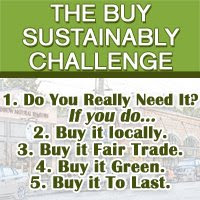
I try to purchase local food as much as possible. Unfortunately, the local farms aren't producing much produce and thus the farmers market is not running. So I am left to shop in the supermarkets for largely imported food. I find it frustrating that there are very few items I can purchase that are not delivered to the shops in some sort of packaging. The one exception is local banana's. They come in their own packaging. I try to avoid plastic packaging as it cannot be recycled here in Bermuda, but still leave the shop with some unwanted plastic.
I rarely purchase anything other than food.
Before we left Britain this time I went through all my stuff and got rid of as much as I could in preparation for moving to America in the spring. I gave away my Mac desktop computer, I gave away my printer, I sold some climbing gear, I recycled a few old cell phones (they had all been given to me when the previous owners upgraded), sent some clothes to thrift shops. But I am shocked at how much stuff I brought away from Bermuda when we left 3 years ago and collected over that time in the UK. I kept most of it because I think it will be useful; tools, electrical supplies for setting up a renewable energy system, various materials for home maintenance. I still ended up with a bag of electrical recycling which has to be specially recycled due to the WEEE initiative.
WEEE directs businesses to take back electrical and electronic consumer goods that they have sold in exchange for a purchase of a newer item. While I like the idea of businesses taking responsibility for goods they sell I don't like linking it to encouraging consumerism. A new report from the Product Policy Institute lays out the climate change costs of consumerism. It turns out that products and packaging account for 44% of US GHG emissions.
"It includes emissions from extracting raw materials, processing materials, manufacturing, transporting, and disposing of non-food goods, and accounts for 29 percent of U.S. greenhouse gas emissions. The goods in this system include all non-food products, all packaging (including for food), vehicles, and materials for buildings and construction (except for heavy infrastructure). Emissions associated with vehicle manufacturing and building construction (including manufacturing of furnaces, hot water heaters, and air conditioners) cannot be separated from other products in the EPA data, so the Provision of Goods slice represents products in a very broad sense."
So what's to be done about it? Here's what the report has to say about it.
"Many approaches for reducing greenhouse gas emissions, for example a cap- and-trade system or renewable electricity standard, act on direct emissions. Implementing these approaches requires knowing where the emissions are physically released. In these cases, only domestic emissions can be addressed. The sectors view is useful in these cases because it tells you the share of emissions coming from a particular type of facility, like electric power plants. Other approaches reduce emissions by changing the ways we produce, consume, and dispose of products and packaging. Manufacturers may improve their design or production process to reduce greenhouse gas impacts. Recycling systems can be improved. Or consumers may choose to buy more sustainable products."
Interesting language there at the end, "buy more". I notice it doesn't say consumers may choose not to purchase products at all. An obvious choice would be to never purchase a tumble dryer. This not only saves mony and the embodied energy and emissions in it's production and transport but also the very high impact in the use of the product. Certainly reducing planned obsolescence, increasing the use of recycled materials, improved carbon accounting methods and attaching the costs of carbon emissions to the products themselves is worth doing. But ultimately we will benefit more from a transition away from an economy based endless growth and pointless consumerism at the soonest possible opportunity.
In any case the planet can no longer support the level of consumerism that the west enjoys and the developing world aspires to. Cell phones are good example. Here in consumerist Bermuda we had students who got a new cell phone every month, either to keep up with the current fad, to match an new outfit, or simply because they lost or broke the last one. Astounding! A sense of value is never cultivated if a child isn't taught it. Instead they possess a sense of entitlement to all the resources of the planet.




.jpg)






No comments:
Post a Comment